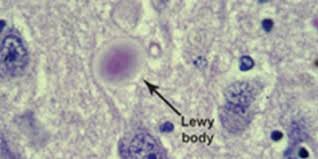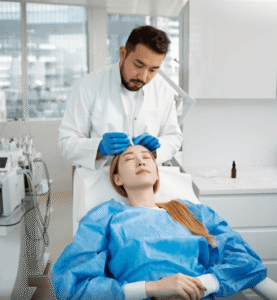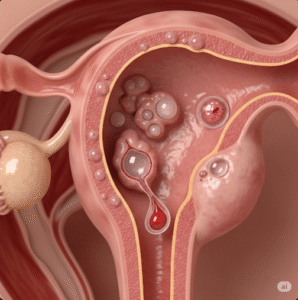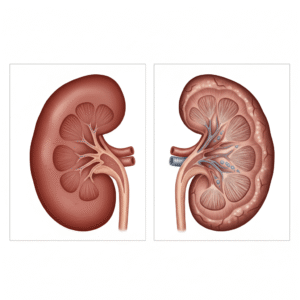Overview
Dementia with Lewy Bodies (DLB) is a progressive neurodegenerative disorder characterized by cognitive decline, fluctuating alertness, and Parkinsonian features. It is the second most common type of degenerative dementia after Alzheimer’s disease. In Korea, specialized care for DLB is available at Seoul National University Hospital, Asan Medical Center, and Samsung Medical Center, where neurologists and geriatric specialists provide diagnosis, treatment, and supportive care.
What is Dementia with Lewy Bodies?
DLB is caused by the abnormal accumulation of alpha-synuclein protein in neurons, forming Lewy bodies that disrupt brain function. It affects cognition, movement, sleep, and behavior, often presenting with overlapping symptoms of Alzheimer’s disease and Parkinson’s disease.
Symptoms
- Fluctuating cognitive abilities and attention
- Visual hallucinations
- Parkinsonism (rigidity, tremors, slow movement)
- Sleep disturbances, including REM sleep behavior disorder
- Autonomic dysfunction (blood pressure changes, constipation, urinary incontinence)
- Mood changes, anxiety, or depression
- Sensitivity to antipsychotic medications
Causes
- Accumulation of Lewy bodies (alpha-synuclein protein) in brain neurons
- Neurodegeneration in cortical and subcortical regions
- Genetic predisposition in some cases
- Age-related vulnerability of the brain
Risk Factors
- Age over 60 years
- Family history of dementia or Parkinson’s disease
- Male gender (slightly higher prevalence)
- History of REM sleep behavior disorder
- Chronic medical conditions affecting the nervous system
Complications
- Increased risk of falls and injuries due to movement difficulties
- Severe cognitive and functional decline
- Behavioral disturbances, agitation, and hallucinations
- Autonomic complications such as blood pressure instability
- Emotional stress for patients and caregivers
- Complications from sensitivity to certain medications
Prevention
- No definitive prevention, but maintaining overall brain health may help
- Regular physical and cognitive exercise
- Healthy diet rich in antioxidants and omega-3 fatty acids
- Management of cardiovascular risk factors
- Early screening for cognitive or motor symptoms in at-risk individuals
Treatment Options in Korea
Treatment is multidisciplinary, focusing on symptom management, safety, and caregiver support.
- Diagnosis
- Detailed clinical evaluation and patient history
- Cognitive tests (MMSE, MoCA)
- Neuroimaging (MRI, DaTscan for dopaminergic deficit)
- Sleep studies for REM sleep behavior disorder
- Medical Treatments
- Cholinesterase inhibitors for cognitive symptoms (donepezil, rivastigmine)
- Levodopa for Parkinsonian symptoms (used cautiously)
- Medications for sleep disturbances and mood disorders
- Avoidance of typical antipsychotics due to severe sensitivity
- Supportive Care
- Physical therapy to maintain mobility and balance
- Occupational therapy for daily living assistance
- Cognitive stimulation and structured routines
- Family education and caregiver support programs
- Specialized Hospitals in Korea
- Seoul National University Hospital – Neurology and geriatric dementia clinics
- Asan Medical Center – Multidisciplinary dementia care
- Samsung Medical Center – Advanced diagnostics and rehabilitation
- Community memory centers for ongoing monitoring and support
- Long-Term Follow-Up
- Regular cognitive and motor function assessments
- Adjusting medications based on symptom progression
- Continuous caregiver education and support
- Safety planning to prevent falls and injuries
- Coordination for long-term care if needed













